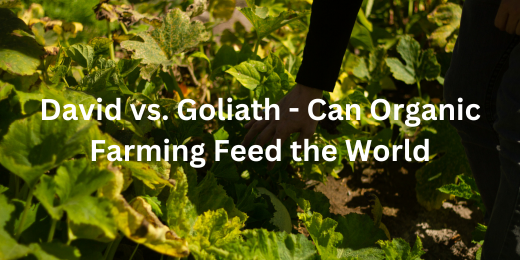
David vs. Goliath – Can Organic Farming Feed the World
Sustainable agriculture practices
The Challenge: Feeding a Growing Population
The escalating need to feed a growing global population amid urbanization and dietary shifts amplifies pressure on conventional farming, reliant on synthetic inputs and monocultures. Addressing environmental impacts and resource scarcity underscores the urgency for sustainable agricultural innovations. These suggestions are essential to guaranteeing food security without jeopardising the ability of generations to come to receive the nourishment they require.
By prioritizing sustainable agriculture practices such as crop rotation, composting, and integrated pest management, organic farming aims to enhance soil fertility, conserve water, and reduce reliance on chemical inputs. These methods not only promote biodiversity and ecosystem health but also contribute to long-term food security by maintaining soil health and resilience against climate change impacts.
Embracing organic farming benefits not only addresses current food production challenges but also aligns with consumer preferences for healthier and environmentally friendly food choices. By investing in sustainable agriculture practices, we can create a food system that is resilient, efficient, and capable of feeding a growing global population while safeguarding the planet’s natural resources for future generations.
Organic Farming: A Sustainable Alternative
Sparked by a growing concern for environmental well-being, organic farming is gaining momentum worldwide as a holistic approach to sustainable agriculture. By prioritising natural methods and nurturing healthy soil, it minimises reliance on chemical fertilisers and pesticides. This eco-conscious method fosters a thriving ecosystem by not only preserving biodiversity but also nurturing soil fertility for a continuous cycle of agricultural abundance.
The shift towards organic farming brings numerous benefits. It promotes soil health through composting and crop rotation, reducing environmental impact. Farmers experience fewer health risks associated with chemical exposure, while consumers benefit from pesticide-free produce. Moreover, organic practices support local ecosystems and wildlife, contributing to a more balanced agricultural landscape.
In conclusion, the adoption of organic farming represents a pivotal step towards sustainable agriculture practices. By working in concert with natural processes, organic farming cultivates a symbiotic relationship between agriculture and the environment, fostering healthier ecosystems and thriving communities that benefit for generations to come. As awareness grows, so does the demand for organically grown products, reinforcing the movement towards a more sustainable future.
Can Organic Farming Meet South India’s Needs?
Throughout South India, a wave of organic farming is taking root, emerging as a pioneering force for a sustainable and ecologically responsible agricultural future. Successful examples highlight improved yields through advanced techniques and infrastructure. However, widespread adoption requires substantial government support and comprehensive farmer education on organic methods’ benefits and implementation.
Organic farms in South India showcase the benefits of organic farming, such as enhanced soil health and reduced chemical usage. With proper techniques, these farms have shown potential for increased yields over time. To realise its full potential, investment in infrastructure like irrigation and storage facilities is crucial to support sustainable practices.
Government support is pivotal in promoting sustainable agriculture practices across South India. Policies that incentivise organic farming and provide financial aid for infrastructure development are essential. Equally important is educating farmers about organic techniques and their long-term benefits, ensuring a successful transition towards sustainable agriculture in the region.
Beyond Food Production: The Benefits of Organic Farming
Organic farming transcends mere food production, fostering a regenerative cycle that nourishes the land, cultivates biodiversity, and ultimately yields a bounty of healthy produce. It minimises water pollution and reduces environmental impact compared to conventional methods. Additionally, organic produce often commands premium prices in markets due to its perceived health benefits and sustainable practices.
By focusing on organic farming, farmers nurture soil through natural fertilisers and crop rotation, fostering long-term sustainability. By eschewing synthetic chemicals in favour of organic methods, this approach fosters a healthier environment for local ecosystems and safeguards the purity of nearby water sources. Consumers increasingly value organic products for their nutritional value and minimal environmental footprint, driving market demand.
In conclusion, embracing sustainable practices like organic farming fosters a holistic approach to agriculture, enriching soil health, safeguarding water resources, promoting biodiversity, and ultimately nourishing both our communities and the planet for generations to come.
Obstacles and Remedies for South Indian Organic Farming
Organic farming in South India faces challenges such as the limited availability of organic inputs and high certification costs. To overcome these hurdles, investment in local production of organic inputs and subsidised certification schemes are essential for sustainable agricultural growth.
The inadequate infrastructure for storage and transportation poses another challenge for organic farming. Building cold storage facilities and improving transport networks would ensure the quality and availability of organic produce, meeting market demands effectively.
Educating consumers about the benefits of organic products and fostering trust in organic certifications is crucial. Increased awareness can drive demand, supporting farmers who adopt sustainable agriculture practices in South India and promoting a healthier environment overall.
The Future of Farming in South India: A Balanced Approach
Organic farming and conventional methods can co-exist in South India’s agricultural landscape. Both approaches have merits, and ongoing research and development are crucial to enhancing their effectiveness. Balancing these methods ensures diverse farming options that cater to varying environmental and economic needs.
Investing in sustainable farming practices is pivotal for South India’s agricultural future. This includes adopting techniques that conserve soil health, minimise chemical use, and promote biodiversity. Such practices not only safeguard the environment but also enhance resilience against climate change and fluctuating market conditions.
The future of farming in South India hinges on integrating innovative approaches while respecting traditional wisdom. By embracing both organic and conventional farming, supported by robust research and sustainable practices, the region can achieve food security and economic prosperity in a balanced manner. Dive deeper into the world of organic farming and nourish your life with fresh, sustainable produce by visiting your nearest Uyir Organic Farmers Market, or explore their extensive online selection at www.uyironline.in or www.uyirorganic.farm.